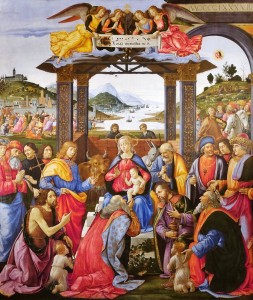
Thomas Stearns Eliot (Saint Louis, 26 settembre 1888 – Londra, 4 gennaio 1965) è stato un poeta, saggista, critico letterario e drammaturgo statunitense naturalizzato britannico. E’ stato Premiato nel 1948 con il Nobel per la Letteratura.
Nicola D’Ugo traduttore, poeta, narratore, saggista, critico cinematografico e letterario, traduce una delle più belle poesie di T. S. Eliot, Journey Of The Magi, (Viaggio dei magi), scritta dal grande poeta nel 1927 e contenuta in T. S. Eliot, Collected Poems 1909-1962, Harcourt, New York 1991, pp. 99-100).
Nicola D’Ugo is an Italian poet, fiction writer, essayist, comparatist, and translator. He holds a PhD in English Literatures from the Sapienza of the Rome.
Domenico Ghirlandaio: ‘Adorazione dei Magi degli Innocenti’, 1488 circa. Ospedale degli Innocenti, Firenze.
Viaggio dei Magi
di T. S. Eliot
«Fu una gelida venuta per noi,
Proprio il tempo peggiore dell’anno
Per un viaggio, e per un viaggio lungo come questo:
Le strade affondate e la stagione rigida,
Nel cuore fitto dell’inverno.»
E i cammelli irritati, gli zoccoli doloranti, restii,
Che si stendevano sulla neve che si andava sciogliendo.
Ci furono momenti in cui rimpiangemmo
I palazzi estivi sui pendii, le terrazze,
E le fanciulle di seta che portano i sorbetti.
Poi i cammellieri che sbottavano in bestemmie e lamentele
E se ne scappavano, e rivolevano i loro liquori e le loro donne,
E i falò notturni che si spegnevano, e l’assenza di ripari,
E le città inospitali, e ostili le cittadine,
E sporchissimi i paesini che vendevano a prezzi esosi:
Sono stati momenti durissimi per noi.
Alla fine preferimmo viaggiare intere nottate,
Dormendo a tratti,
Con le voci che ci cantavano nelle orecchie, che dicevano
Che era tutta una pazzia.
Poi all’alba scendemmo in una valle temperata,
Umida, sotto la coltre di neve, odo¬rante di vegetazione,
Con un ruscello che scorreva ed un mulino ad acqua che picchiava il buio
E tre alberi davanti al cielo basso.
E un vecchio cavallo bianco galoppò via per i prati.
Poi arrivammo ad una bettola con dei pampini sulla volta,
Sei mani nel vano della porta si giocavano a dadi pezzi d’argento,
E i piedi scalciavano gli otri vuoti.
Ma di informazioni non ce n’erano, e così proseguimmo
E arrivammo di sera, senza un istante di anticipo
Trovando il luogo; fu (direste voi) una soddisfazione.
Tutto questo è successo molto tempo fa, lo ricordo,
E lo farei ancora, ma appuntatevi
Questo appuntatevi
Questo: siamo stati condotti per tutta quella strada per
Una Nascita o per una Morte? Vi fu una Nascita, certamente,
Ne abbiamo avuto la prova e mai un dubbio. Avevo visto le nascite e le morti,
Ma avevo creduto che fossero diverse; questa Nascita fu
Una dura e amara agonia per noi, come la Morte, la nostra morte.
Tornammo nei nostri possedimenti, in questi Regni,
Ma non più a nostro agio qui, coi vecchi ordinamenti,
Tra un popolo straniero aggrappato ai propri dèi.
Sarei lieto di un’altra morte.
1927
(Traduzione di Nicola D’Ugo, 2014)
Journey Of The Magi
by T. S. Eliot
‘A cold coming we had of it,
Just the worst time of the year
For a journey, and such a long journey:
The ways deep and the weather sharp,
The very dead of winter.’
And the camels galled, sore-footed, refractory,
Lying down in the melting snow.
There were times we regretted
The summer palaces on slopes, the terraces,
And the silken girls bringing sherbet.
Then the camel men cursing and grumbling
And running away, and wanting their liquor and women,
And the night-fires going out, and the lack of shelters,
And the cities hostile and the towns unfriendly
And the villages dirty and charging high prices:
A hard time we had of it.
At the end we preferred to travel all night,
Sleeping in snatches,
With the voices singing in our ears, saying
That this was all folly.
Then at dawn we came down to a temperate valley,
Wet, below the snow line, smelling of vegetation,
With a running stream and a water-mill beating the darkness
And three trees on the low sky.
And an old white horse galloped away in the meadow.
Then we came to a tavern with vine-leaves over the lintel,
Six hands at an open door dicing for pieces of silver,
And feet kicking the empty wine-skins.
But there was no information, and so we continued
And arrived at evening, not a moment too soon
Finding the place; it was (you may say) satisfactory.
All this was a long time ago, I remember,
And I would do it again, but set down
This set down
This: were we led all that way for
Birth or Death? There was a Birth, certainly,
We had evidence and no doubt. I had seen birth and death,
But had thought they were different; this Birth was
Hard and bitter agony for us, like Death, our death.
We returned to our places, these Kingdoms,
But no longer at ease here, in the old dispensation,
With an alien people clutching their gods.
I should be glad of another death.
1927
Poesia
di Luigia Sorrentino. Il primo blog della Rai dedicato alla poesia
